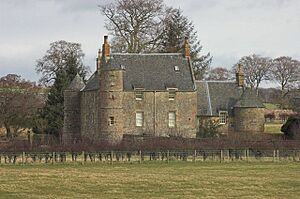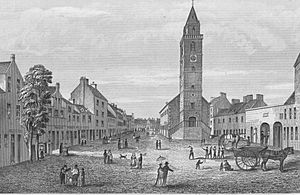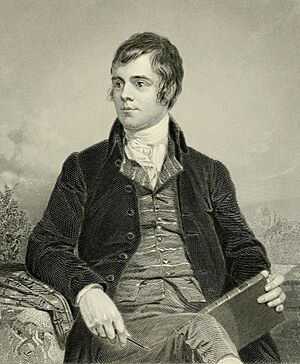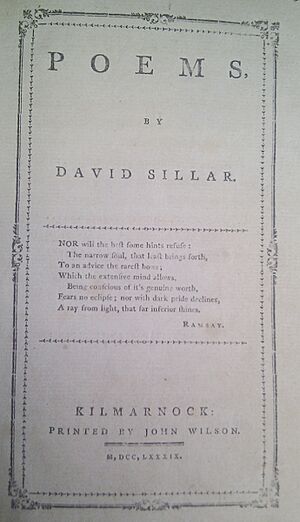David Sillar facts for kids
Quick facts for kids
David Sillar
|
|
|---|---|
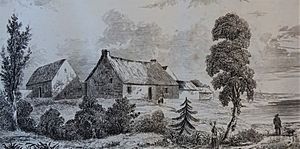
Spittleside Farm, Tarbolton
|
|
| Born | 1760 Spittalside, Tarbolton, Scotland
|
| Died | 2 May 1830 Irvine, North Ayrshire, Scotland
|
| Occupation | Farmer, teacher, poet, grocer, and, baillie |
David Sillar (1760–1830) was a Scottish farmer, poet, grocer, and schoolteacher. He was also a baillie, which is like a local town official or magistrate. David Sillar was a very close friend of the famous Scottish poet Robert Burns.
He passed away in 1830 at the age of 70 after being sick for a long time. He was buried in Irvine's Old Parish Church cemetery. His original gravestone was worn out, but the Irvine Burns Club replaced it with a new one that looked just like the old one. David Sillar was married twice and had only one son who lived longer than him, Dr. Zachary Sillar. David's father, Patrick Sillar, was a farmer at Spittalside, near Tarbolton, Scotland.
Contents
David Sillar's Life Story
David was the third of four sons. His family lived at Spittalside Farm, which was close to where Robert Burns's family lived at Lochlea. David's brother William later took over the farm. His older brothers, Robert and John, became successful merchants.
David taught himself many things. He even worked as a temporary teacher in Tarbolton. However, another person, John Wilson, got the permanent teaching job. David then tried to start his own school, but it didn't work out.
After this, David moved to Irvine in 1783. He opened a grocery shop near the old Irvine Tolbooth, which was a town hall and also a jail. In 1791, his shop went bankrupt, and he even spent a short time in the Tolbooth because he couldn't pay his debts. He asked his wealthy brothers for a loan, but they said no. This experience stayed with him for a long time.
In 1784, he tried teaching again in Irvine, starting a school to teach navigation (how to sail ships). Irvine was a busy port, so this school was quite successful and gave him a good income. Later, in 1797, he tried to get a job as an English teacher in Irvine, but he wasn't successful.
After these ups and downs, David's luck changed. He inherited a large amount of money, between £30,000 and £40,000, from his uncles who were successful traders. Some say he inherited money from his older brothers, Robert and John, who had done well in trade and died young. He also inherited money and the farm lease from his younger brother, William, who also died young. David's wife managed the farm, and he continued with his school, helping on the farm at weekends.
Once he was financially secure, David became a local politician. He served as a councillor and later as a baillie, which meant he was a local judge or magistrate in Irvine. He bought several properties in Irvine. He wasn't known for being very generous, possibly because of his earlier struggles. He outlived almost all his family, except for his son who lived in Liverpool.
David was also musical. He played both the dulcimer and the fiddle. He even wrote music for the fiddle. One of his tunes, "A Rosebud by My Early Walk," was sent by Robert Burns to be included in a famous music collection.
David Sillar once courted a woman named Margaret, or Peggy, Orr, who worked at Stair House. Robert Burns even helped him with his courtship. However, their engagement was short, and Peggy later married someone else. In one of his poems, "An Epistle to Davy," Robert Burns wrote about David having his "Meg" (Peggy) and himself having his "Jean" (Jean Armour, Burns's wife).
Catherine Stewart, a lady from Stair House, learned about Robert Burns through his visits with David. She was one of the first upper-class people to recognize Burns's talent and become his friend.
Friendship with Robert Burns
David Sillar was a year younger than Robert Burns. He was probably Burns's closest friend during the time Burns lived at Lochlea. They likely met around 1780 or 1781.
David Sillar wrote down some important details about Robert Burns from their time in Tarbolton. He said that Burns was very social and easily made friends. Burns also had a sharp wit that made people laugh, but it sometimes made others a bit suspicious. David remembered that Burns was the only person in the area who tied his hair back. In church, he wore his plaid (a type of Scottish blanket) in a special way. These things made David very curious to meet him.
David said that after they became friends, they often met on Sundays between church services. Instead of going to the inn with others, they would walk in the fields. David noticed how easily Burns talked to women. David himself would often be shy and unsure what to say, but Burns would start conversations with great ease.
David Sillar was not one of the first members of the Tarbolton Bachelor Club, but he joined in 1781. This club was a group where young men would meet and discuss different topics. David even wrote down a copy of the club's rules.
David and Burns continued to write letters to each other after Burns left Tarbolton in 1785. Robert Burns also wrote two poems about David, called the "Epistle(s) to Davie."
In the summer of 1791, David's grocery business was failing, and he had to ask Burns for a loan. However, Burns was also short on money at the time and couldn't help him.
In August 1791, Burns wrote to David, who had recently gotten married.
In 1826, David Sillar helped start the Irvine Burns Club and became its first vice-president. This club celebrates the life and works of Robert Burns.
David Sillar's Poetry
In 1789, David published a book of his own poems, which was 247 pages long. He used the same printer as Robert Burns. Robert Burns even helped David sell his poems. Burns wrote to David in January 1790, sending him money from eleven people who had bought David's book. Unfortunately, David's poems were not very popular. Some people said they were a bit heavy and not very funny. It's even thought that he spent so much time writing poetry that it might have contributed to his grocery business failing.
In his second poem to David, Robert Burns wrote:
|
In this poem, Burns is wishing David well and encouraging him to keep playing his fiddle. He also playfully warns David not to neglect his poetry (the "Muse").
The Irvine Burns Club owns two original letters that Robert Burns wrote to David Sillar. These letters were bought by the club in 1975 from one of David Sillar's great-great-grandsons. They are friendly letters where Burns talks about getting people to buy Sillar's poetry book.
The Irvine Burns Club also has a copy of a speech David Sillar gave in his own handwriting. He gave this speech as Vice-President of the club at their first celebration dinner in January 1828. His son, Dr. Zachariah Sillar, who later became president of the club, gave this manuscript to the club.
Interesting Facts
David Sillar was one of the first people to donate money for a monument to Robert Burns in Alloway. However, there's a story that when he was asked to donate, he said, "No, no; you starved the man when he was living among ye, and I refuse to join in useless expenditure now that he is dead." This suggests he felt people didn't support Burns enough when he was alive.
David was also a member of the Mauchline Conversation Society, a group that met to discuss different topics like moral questions and politics. Robert Burns's brother, Gilbert Burns, was also a member.
David Sillar lent a large sum of money, £4,000, to the daughter of Catherine Stewart of Stair House and to the Earl of Eglinton.
Because he generously donated £100 to the Irvine Academy (a school), he was made a "life Director" of the school.
See also
- Alison Begbie
- Elizabeth Paton
- Helen Hyslop
- Isabella Steven
- Jean Armour
- Jean Glover
- Jenny Clow
- Jessie Lewars
- Kate Kemp
- Lesley Baillie
- List of 18th-century British working-class writers
- Mary Campbell (Highland Mary)
- May Cameron
- Nelly Blair
- Nelly Kilpatrick
- Peggy Thompson


